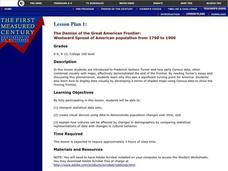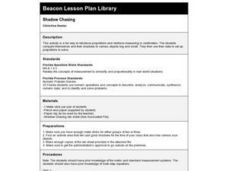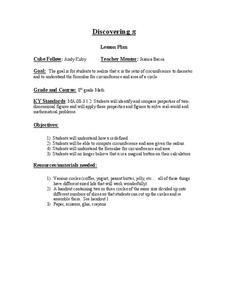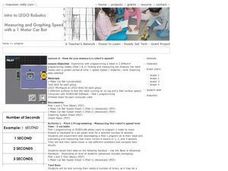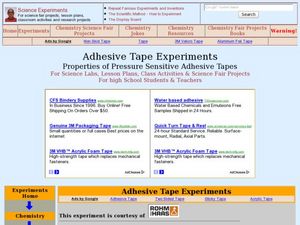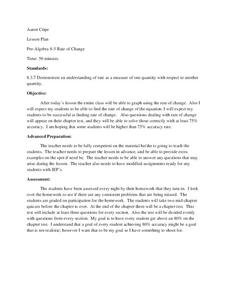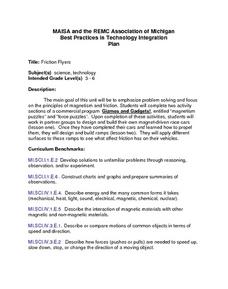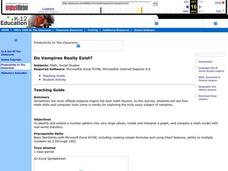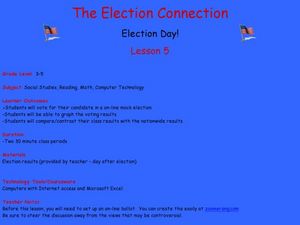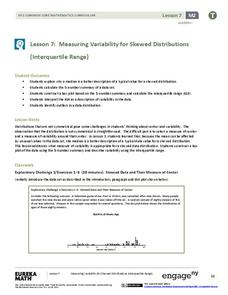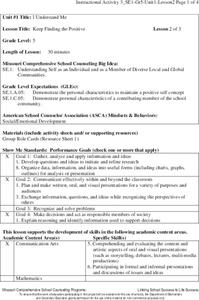Curated OER
The Big Hand Challenge
Students utilize a computer spreadsheet to record and analyze data. For this problem solving lesson, students compare their hand size to that of the principal. Students understand standard and nonstandard measurement.
Curated OER
The Demise of the Great American Frontier
Students are introduced to Frederick Jackson Turner and how early Census data, when combined visually with maps, effectively demonstrated the end of the frontier.
Curated OER
Proteomics
Students analyze data taken from proteomic experiments. In this biology lesson plan, students explain the importance of bioinformatics tools in the study of proteins. They evaluate scientific results using math and computer software.
Curated OER
Shadow Chasing
The students compare themselves and their shadows to various objects big and small. Students use their data to set up proportions to solve.
Curated OER
What Are the Layers of the Rain Forest?
Students investigate the different levels of the rain forest by comparing it to an apartment. In this ecology lesson, students practice using forest related vocabulary words and complete a vocabulary data sheet. Students create...
Curated OER
Is There Water on Mars?
Students decide whether or not there is or has even been water on Mars. They analyze temperature and pressure data from the Pathfinder mission to Mars, and then they analyze images of Mars, interpreting the landforms they see and...
Curated OER
Discovering Pi
Young scholars relate Pi to a circle. In this circles lesson, students identify the different properties of two dimensional objects. They relate Pi to the circumference, diameter and area of a circle .
Curated OER
Roman Archy
Third graders use Google Earth to examine Roman architecture. In this ancient Rome lesson, 3rd graders visit the noted URLs to look at examples of Roman architecture. Students work in teams to examine data about the structures.
Curated OER
Lights Light Up My Life
Students conduct an investigation. In this energy conservation lesson, students observe and make predictions about fluorescent and incandescent light bulbs. Working in groups, students conduct an investigation to compare the two light...
Curated OER
Introduction to Lego Robotics
Students utilize computer programs to operate a simple robot. In this technology instructional activity, students create robots using Lego pieces and simple motors to move them. Students measure the speed of the robots by running...
Curated OER
"Stick to It!" Properties of Pressure Sensitive Adhesive Tapes
Young scholars investigate the strength of different adhesives. In this physical science lesson, students compare the force needed to peel adhesive tapes from a surface. They analyze collected data and make a generalization.
Curated OER
Rate of Change
Eleventh graders solve problems dealing with rate of change. For this algebra lesson, 11th graders graph their rate of change problems and analyze it comparing their data with each other. They solve problems dealing with percent and rate...
Curated OER
Friction Flyers
Young scholars explore the principles of magnetism and friction. They complete an interactive puzzle on the Gizmos and Gadgets computer software, construct a vehicle, build and modify ramps and vehicles to produce various outcomes, and...
Curated OER
Money
Students count money using only coins. In this money instructional activity, students read Bennies Pennies, practice counting the pennies in the story and are then introduces to the different coins, penny, nickel, dime and quarter. ...
Curated OER
Do Vampires Really Exist?
Students identify and extend a number pattern into very large values. They create and interpret a graph based on their number patterns. Students compare a math model with real-world statistics about the existence of vampires.
Curated OER
Involving Community Members, Parents, and Community Agencies in Student Learning
Students predict and estimate the number of moose shot by people between the years of 1986-1990. They analyze data and statistics, construct bar graphs, and conduct research on the Alaskan moose.
Curated OER
The Election Connection
Students participate in a mock election. In this election lesson, students vote online in a mock election, graph the results, and compare their results to the nationwide results.
EngageNY
Measuring Variability for Skewed Distributions (Interquartile Range)
Should the standard deviation be used for all distributions? Pupils know that the median is a better description of the center for skewed distributions; therefore, they will need a variability measure about the median for those...
Cornell University
Beam Focusing Using Lenses
Explore optics using an inquiry-based experimental approach! Young scholars use a set of materials to design and build a unit capable of focusing a beam of light. They experiment with different lenses to determine the best approach to...
School District of Palm Beach County
Framed Paragraphs characterization, problem and solution, symbolism, conflict
Support your learners as they work on writing paragraphs by providing graphic organizers, outlines, and frames. Sift through this packet to find the perfect organizers and templates to prepare pupils for writing. The resource...
Missouri Department of Elementary
Keep Finding the Positive
Group members take on roles to create a positive classroom community. Learners perform their role—leader, recorder, presenter, timekeeper, encourager, and collector—in preparation for a formal presentation of their positive thinking...
Curated OER
Watershed Analysis
Students conduct a regional watershed analysis of an area of their choosing. Using on-line data and their personal knowledge of the area, they determine the annual hydrologic budget and teach the class about "their" watershed.
Curated OER
Comparing Temperatures of US REgions
Third graders explore regional factors that affect daily temperature. They collect data on three cities in the northeast, southeast and midwest regions of the US for two weeks. The Weather Channel website is used each day to collect...
Curated OER
Take Me Out To the Ball Game
Students use a map to graph and locate major league teams of different sports. In groups, they analyze the population data of the United States and compare it with the amount and location of the major league teams. They share their...



